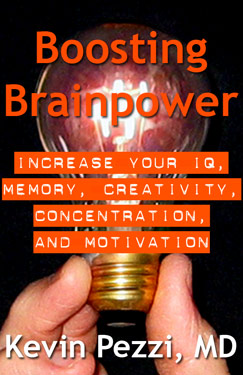Should he become an ER doctor?

Don't you just LOVE math? :-)
Q: I've spent a lot of time perusing your ER sites and found a great deal of the information vastly useful and helpful in my pursuits. However, I am still left with one lingering question, the question that has been plaguing me for quite some time. Whatever career I pick, I want it to be one where I have an impact on people. Despite the fact that mathematics is where I'm truly gifted, I have considered other careers in light of the fact that while I love and believe in the power of math, at the end of the day, I feel as if I could be contributing something more to my fellow man.
Emergency medicine is of a particular interest to me because of the high pressure and high demand environment, something which I tend to thrive on (although I certainly understand that nothing I have experienced can prepare me for the amount of pressure and demand in a typical ER). I've taken a few biology classes and done fine, and really only need to take a little more biology and organic chemistry in preparation for the medical school, so my problem lies in the fact that I am entering my senior year of undergraduate work and it's time to make a decision.
My question is, for someone who finds the technical aspect of medicine interesting, but not necessarily fascinating (math is my first love), but is rather motivated by a pervasive moral obligation to help his fellow man as much as possible, would this motivation be sufficient to have a successful career in emergency medicine? Thank you for any help; this decision is weighing heavily on me and any professional input would be greatly appreciated.
Answer by Kevin Pezzi, MD: Some of your statements made me think that a math career would be best for you, while others suggested that emergency medicine is the way to go. I'll analyze these one by one:
> Whatever career I pick, I want it to be one where I have an impact on people.
You would have a greater, more immediate, and longer-lasting impact on the lives of more people by choosing an ER career. As you know, math is one of the fundamental tools that helps scientists in diverse fields obtain a better understanding of our world and hence improve our lives, but the impact made by a single mathematician is generally insignificant in terms of deciding who lives and who dies. As an ER doctor, in contrast, you will influence the lives of countless people during your career and indefinitely into the future. This latter aspect is one that I've never seen discussed, yet it is obviously true. Let's say that you become a superb ER doc and an ambulance brings an asthmatic teenage girl to your ER. She has not responded to any of the interventions administered by the paramedics (intubation, assisted ventilation, oxygen, and various medications) during their long drive to the hospital. She remains comatose and diffusely purple-gray in color. Basically, she looks dead. Really dead. An ER practitioner with lesser ability might not save her life, but you do. Thus, you've not only saved her life, but also the lives of her children, grandchildren, great-grandchildren, great-great-grandchildren, ad infinitum. Therefore, what you do during a few minutes in the ER will indelibly affect the world forever. During your career, you might treat over 300,000 patients, so you will have a marked impact on the world and its future.
> Despite the fact that mathematics is where I'm truly gifted, I have considered other careers in light of the fact that while I love and believe in the power of math, at the end of the day, I feel as if I could be contributing something more to my fellow man.
For the reasons I just discussed, the last part of your statement again suggests that a career in emergency medicine is your best choice. On the other hand, I think that people should choose a career based on their aptitude for it and how much they enjoy it. Hence, this might weigh in favor of a math career. On the other hand, you might turn out to be equally (or more) gifted in emergency medicine.
Now to address your final question:
> My question is, for someone who finds the technical aspect of medicine interesting, but not necessarily fascinating (math is my first love), but is rather motivated by a pervasive moral obligation to help his fellow man as much as possible, would this motivation be sufficient to have a successful career in emergency medicine?
I understand your predicament because I have a similar problem: To me, medicine is interesting and occasionally fascinating. However, what really makes my dopaminergic neurons light up with joy isn't thinking about the latest treatments for various diseases but inventing. Inventing is my true love and something that I am gifted in.
In general, people should do what they love, assuming that it is a practical career choice. Both ER and math are viable career choices. However, you seem to possess a genuine and deep-seated desire to help others (**see below for an addendum). Based on all of the foregoing discussion, I think that a career as an emergency medicine doctor is a better choice for you. Furthermore, should you wish to do both, it is more feasible to focus on ER and dabble in math in your spare time than to focus on math and dabble in emergency medicine. Many great advances in math were made by people who did other things.
Remember that asthmatic teenager mentioned above? That wasn't a purely hypothetical case, because I had that exact situation early in my ER career. She sent me a card thanking me for saving her life. By now, she probably has children who are enjoying the summertime and loving life, but those kids might not have had the opportunity to live if I had less brainpower and less of a dogged determination to save every critically ill or injured patient. You might think that every ER physician would possess a similar determination to help his patients, but that isn't true. One of my old co-workers comes to mind. His happy-go-lucky attitude spilled over into his medical practice. Coupled with his mediocre ability, that made for some tragic outcomes. Off the top of my head, I can think of two of his patients who died but should have lived (I know of only a small fraction of his cases, so he probably has many more victims). One of those patients was a teenager struck by a car who came into the ER talking and left in a body bag. The other was a young physician with asthma who presented to the ER in much better shape than the young woman mentioned above who I treated, yet my co-worker managed to kill him with his nonchalance and dearth of skills. So as an ER doctor, and especially as an outstanding practitioner, you will make a huge difference in the lives of many people and leave a staggering impact that will affect countless people for millennia.

ER doctors save the lives of few
cheerleaders, but many drunks.
** Regarding your desire to help others: That is admirable, but keep in mind that ER doctors treat many patients who do things that tends to erode all but the most resolute idealism. As a result, many ER doctors become cynical and even embittered. You will save the lives of more drunks, drug addicts, dope dealers, and criminals than Sunday-school teachers, cheerleaders, or soccer moms or dads. This is statistically inevitable (at least in the United States) because the former group (drunks, etc.) does things that heightens their risk of needing emergency care. If you save the life of a drunk, he might need saving a few days later. I've seen some drunks so many times in the ER that I memorized their medical records number! Incidentally, by saving some drunks, you will give them the opportunity to continue drinking in the future and perhaps kill a family of five people in a horrendous automobile accident. It happens all the time.
Back to the main Question & Answer page

